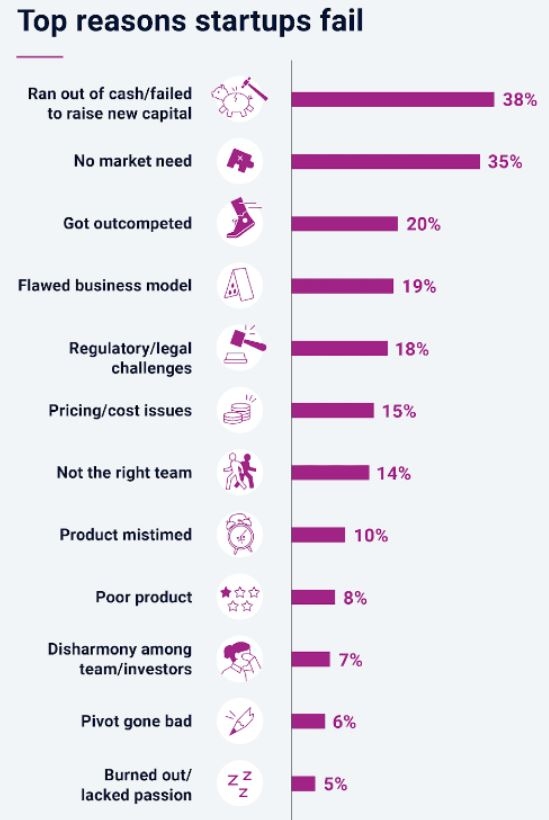Imagine putting your heart and soul into research, starting your own venture, and eventually failing. How does it feel? The emotional strain of having your startup turn into a failure is huge. This is because the initial founders not only put their efforts, money, and time into building it but also their dreams. When their startup fails, they experience immense turmoil, disappointment, and embarrassment. This slowly and gradually leads to depression and anxiety, which later becomes very overwhelming for the founders.
According to research by a professor of entrepreneurship at Harvard, around two-thirds of startups fail to show a positive return to investors and owners. After further digging in and looking at post-mortems, a few common startup mistakes leading to failure are:
Running out of funds and investments
Targeting and entering the wrong market
Lack of research
Incompatible partnership
Poor marketing strategies
Not being an expert
Unrealistic investor expectations

Top 10 Startup Failure Reasons 2024
1. Running Out Of Funds And Investments
Many times, new ventures face the issue of funding and investment. In the initial days, it is less likely for a baby business to start generating revenue and profits; therefore, it is important that the cash flow does not dry up. Since the sales are not high enough in the starting period, the outflow of cash becomes more than the inflow, which becomes a hurdle in sustaining the business for the longer term.
2. Targeting And Entering The Wrong Market
Defining the right target market is extremely important if a business wants to survive in the long run. But in reality, many businesses start out by targeting a larger market as their demographic, and this leads them towards failure since they cannot cater to the entire market.
3. Lack Of Research
Doing research is crucial before advertising your product or services. Before launching your business, it is important to know if your target customers even want your product or service. Entering the market without doing your homework and having no knowledge of what the customers want can also pave the path toward failure.
4. Incompatible Partnership
Having a partner whose psyche matches yours is also essential before signing a partnership. Having different thinking and working patterns can become a cause of conflict, eventually taking your business toward failure. It’s always better to have an apparent business plan that defines the duties of each partner. This will help in avoiding the rise of conflicts.
5. Poor Marketing Strategies
Well-planned marketing strategies never fail to bring in results. But in reality, many entrepreneurs don’t pay importance to this aspect of running a successful business. They believe investing in marketing will only turn out to be an additional expenditure. But if done correctly, it can lead to sales double the amount spent.
6. Not Being An Expert
Without expertise and relevant skills, an entrepreneur and their business cannot succeed. In order to start a venture that produces results, one must know what they are doing and how they are supposed to do it.
7. Unrealistic Investor Expectations
Investors believe that they will reap high profits on their investments as soon as the venture is launched. They do not tend to understand that business operations are not so easy. In fact, they are complex and need extensive planning.
8. Less Transparency
Transparency between startups and investors is very important to run efficient operations. Lack of clarity can lead to hasty and poor decision-making and misallocation of funds.
9. No Existence Of Management Information Systems (MIS)
The absence of management information systems (MIS) stops startups from making the right decisions. Startups tend to delay the implementation of MIS, which leads to poor decision-making based on incomplete or inaccurate information. To run a successful business, it is crucial to have timely access to relevant data.
10. Unbalanced Attention To Other Business Aspects
Another common issue is being focused on only one aspect of the business. Founders sometimes concentrate only on the core operations of their ideas. This results in neglecting the other areas that are equally important. These include human resources, sales, marketing, finance, and administration.
How To Prevent Startup Failure?
All of the factors mentioned above can lead your venture towards its end before it has even started. So, if you want to be part of the one-third of startups that flourish in their early years, you must do the following:
Set realistic and achievable goals
Conduct thorough market research
Niche down and then define your target market
Learn the required skills and become an expert
Do not make hasty decisions
Implement a Management Information System (MIS)
Generate enough funds and investments
Be passionate about what you are doing
Do not give up early, and stay patient.
Conclusion
Summing it up, doing your homework before heading out to start any venture is essential. When you are aware of the needs and wants of your target market, after you have selected a niche, then only you can provide them with what they are looking for. In addition to this, customer retention also plays a huge role in the success of a startup. So, make sure you provide high-quality products and services and cater to the needs of your customers in the best way possible.


















Leave a comment